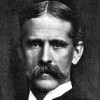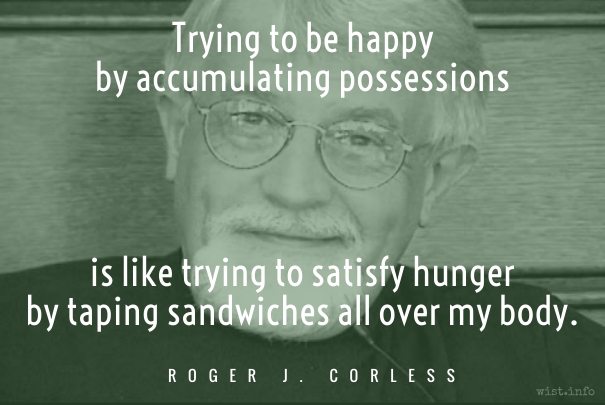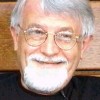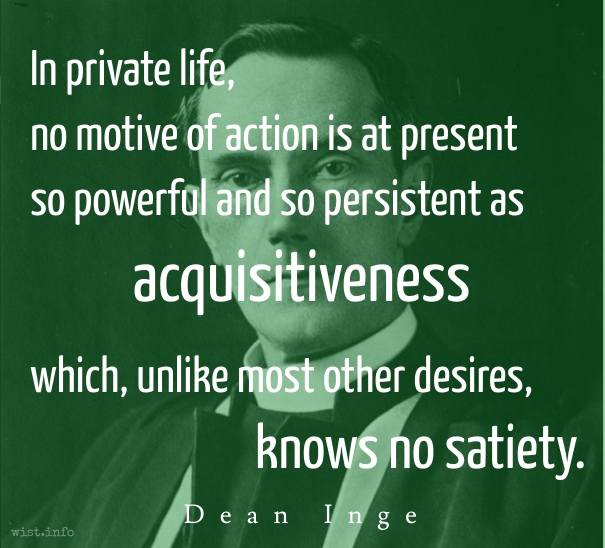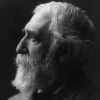Any man with few needs appears a menace to the rich for he is always in a position to escape from them, and the tyrants see that thus they lose a slave.
[Tout homme qui a peu de besoins semble menacer les riches d’être toujours prêt à leur échapper. Les tyrans voient par là qu’ils perdent un esclave.]
Nicolas Chamfort (1741-1794) French writer, epigrammist (b. Nicolas-Sébastien Roch)
Products of Perfected Civilization [Produits de la Civilisation Perfectionée], Part 1 “Maxims and Thoughts [Maximes et Pensées],” ch. 3, ¶ 266 (1795) [tr. Mathers (1926)]
(Source)
(Source (French)). Alternate translations:
Any man whose needs are few seems to threaten the rich with the possibility of his escaping them. Tyrants are thereby faced with the prospect of losing a slave.
[tr. Merwin (1969)]
Any man who has few needs seems to threaten the rich with his readiness to escape from them. Thereby tyrants realize that they are losing a slave.
[tr. Pearson (1973)]
Every man who has few needs seems to menace the wealthy with the constant threat of escaping from them. Tyrants see in such a proposition the loss of a slave.
[tr. Siniscalchi (1994)]
Anyone whose needs are small seems threatening to the rich, because he's always ready to escape their control. This is how tyrants recognize that they're losing a slave.
[tr. Parmée (2003)]
Quotations about:
materialism
Note not all quotations have been tagged, so Search may find additional quotes on this topic.
We never understand how little we need in this world until we know the loss of it.
James Barrie (1860-1937) Scottish novelist and dramatist
Margaret Ogilvy, ch. 8 “A Panic in the House” (1896)
(Source)
A biographical work about his mother and family. He identifies this as a favorite saying of hers.
Trouble arises when either science or religion claims universal jurisdiction, when either religious dogma or scientific dogma claims to be infallible. Religious creationists and scientific materialists are equally dogmatic and insensitive. By their arrogance they bring both science and religion into disrepute. The media exaggerate their numbers and importance. The media rarely mention the fact that the great majority of religious people belong to moderate denominations that treat science with respect, or the fact that the great majority of scientists treat religion with respect so long as religion does not claim jurisdiction over scientific questions.
Freeman Dyson (1923-2020) English-American theoretical physicist, mathematician, futurist
“Progress in Religion,” Templeton Prize acceptance speech, Washington National Cathedral (9 May 2000)
(Source)
Many pleasant things are better when they belong to someone else. You can enjoy them more that way. The first day, pleasure belongs to the owner; after that, to others. When things belong to others, we enjoy them twice as much, without the risk of losing them, and with the pleasure of novelty. Everything tastes better when we are deprived of it.
[Muchas cosas de gusto no se han de poseer en propiedad. Más se goza de ellas ajenas que propias. El primer día es lo bueno para su dueño, los demás para los extraños. Gózanse las cosas ajenas con doblada fruición, esto es, sin el riesgo del daño y con el gusto de la novedad. Sabe todo mejor a privación.]
Baltasar Gracián y Morales (1601-1658) Spanish Jesuit priest, writer, philosopher
The Art of Worldly Wisdom [Oráculo Manual y Arte de Prudencia], § 264 (1647) [tr. Maurer (1992)]
(Source)
(Source (Spanish)). Alternate translations:
Many things that serve for pleasure, ought not to be peculiar. One enjoys more of what is another's, than of what belongs to himself. The first day is for the Master, and all the rest for Strangers. One doubly enjoys what belongs to others, that's to say, not only without fear of loss, but also with the pleasure of Novelty. Privation makes every thing better.
[Flesher ed. (1685), §263]
Many things of Taste one should not possess oneself. One enjoys them better if another's than if one's own. The owner has the good of them the first day, for all the rest of the time they are for others. You take a double enjoyment in other men's property, being without fear of spoiling it and with the pleasure of novelty. Everything tastes better for having been without it.
[tr. Jacobs (1892)]
Many of the things that bring delight should not be owned. They are more enjoyed if another's, than if yours; the first day they give pleasure to the owner, but in all the rest to the others: what belongs to another rejoices doubly, because without the risk of going stale, and with the satisfaction of freshness; everything tastes better after fasting.
[tr. Fischer (1937)]
They tell me thou art rich, my country: gold
In glittering flood has poured into thy chest;
Thy flocks and herds increase, thy barns are pressed
With harvest, and thy stores can hardly hold
Their merchandise; unending trains are rolled
Along thy network rails of East and West;
Thy factories and forges never rest;
Thou art enriched in all things bought and sold!But dost thou prosper? Better news I crave.
O dearest country, is it well with thee
Indeed, and is thy soul in health?
A nobler people, hearts more wisely brave,
And thoughts that lift men up and make them free, —
These are prosperity and vital wealth!Henry Van Dyke (1852-1933) American clergyman and writer
“America’s Prosperity” (1 Oct 1916), The Red Flower: Poems Written in War Time (1917)
(Source)
Men use up their lives in heart-breaking political struggles, or get themselves killed in civil wars, or tortured in the secret prisons of the Gestapo, not in order to establish some central-heated, air-conditioned, strip-lighted Paradise, but because they want a world in which human beings love one another instead of swindling and murdering one another. And they want that world as a first step. Where they go from there is not so certain, and the attempt to foresee it in detail merely confuses the issue.
George Orwell (1903-1950) English writer [pseud. of Eric Arthur Blair]
“Can Socialists Be Happy?” Tribune (1943-12-20) [as John Freeman]
(Source)
By convention sweet is sweet, by convention bitter is bitter, by convention hot is hot, by convention cold is cold, by convention color is color. But in reality there are atoms and the void. That is, the objects of sense are supposed to be real and it is customary to regard them as such, but in truth they are not. Only the atoms and the void are real.
[νόμωι (γάρ φησι) γλυκὺ καὶ νόμωι πικρόν, νόμωι θερμόν, νόμωι ψυχρόν, νόμωι χροιή, ἐτεῆι δὲ ἄτομα καὶ κενόν]
Democritus (c. 460 BC - c. 370 BC) Greek philosopher
Frag. 0 (Diels) [tr. Bakewell (1907)]
(Source)
Cited to Tetralogies of Thrasyllus, 9; Sext. Emp. Math VII 135. Alternate translations:
- "Sweet exists by convention, bitter by convention, colour by convention; atoms and Void (alone) exist in reality ... We know nothing accurately in reality, but (only) as it changes according to the bodily condition, and the constitution of those things that flow upon (the body) and impinge upon it." [tr. Freeman (1948), frag. 9]
- "By convention sweet is sweet, bitter is bitter, hot is hot, cold is cold, color is color; but in truth there are only atoms and the void." [tr. Durant, from Bakewell]
The brain is only three pounds of blood, dream, and electricity, and yet from that mortal stew come Beethoven’s sonatas. Dizzy Gillespie’s jazz. Audrey Hepburn’s wish to spend the last month of her life in Somalia, saving children.
Diane Ackerman (b. 1948) American poet, author, naturalist
A Natural History of Love, “Brain-Stem Sonata: The Neurophysiology of Love” (1994)
(Source)
Making money ain’t nothing exciting to me. … You might be able to buy a little better booze than some wino on the corner. But you get sick just like the next cat, and when you die you’re just as graveyard dead as he is.
The aim of life is appreciation; there is no sense in not appreciating things; and there is no sense in having more of them if you have less appreciation of them.
Gilbert Keith Chesterton (1874-1936) English journalist and writer
The Autobiography of G. K. Chesterton (1936)
(Source)
And the Grinch, with his grinch-feet ice-cold in the snow,
Stood puzzling and puzzling: “How could it be so?
“It came without ribbons! It came without tags!
“It came without packages, boxes or bags!”
And he puzzled three hours, till his puzzler was sore.
Then the Grinch thought of something he hadn’t before!
“Maybe Christmas,” he thought, “doesn’t come from a store?”
“Maybe Christmas … perhaps … means a little bit more?”Dr. Seuss (1904-1991) American author, illustrator [pseud. of Theodor Geisel]
How the Grinch Stole Christmas (1957)
(Source)
But beware you be not swallowed up in books: An ounce of love is worth a pound of knowledge.
John Wesley (1703-1791) English cleric, Christian theologian and evangelist, founder of Methodism
Letter to Joseph Benson (7 Nov 1768)
(Source)
By fixing men’s minds, not upon the discharge of social obligations, which restricts their energy, because it defines the goal to which it should be directed, but upon the exercise of the right to pursue their own self-interest, it offers unlimited scope for the acquisition of riches, and therefore gives free play to one of the most powerful of human instincts. To the strong it promises unfettered freedom for the exercise of their strength; to the weak the hope that they too one day may be strong. Before the eyes of both it suspends a golden prize, which not all can attain, but for which each may strive, the enchanting vision of infinite expansion. It assures men that there are no ends other than their ends, no law other than their desires, no limit other than that which they think advisable. Thus it makes the individual the center of his own universe, and dissolves moral principles into a choice of expediences.
R. H. Tawney (1880-1962) English writer, economist, historian, social critic [Richard Henry Tawney]
The Acquisitive Century, ch. 3 “The Acquisitive Society” (1920)
(Source)
We make ourselves miserable by first closing ourselves off from reality and then collecting this and that in an attempt to make ourselves happy by possessing happiness. But happiness is not something I have, it is something I myself want to be. Trying to be happy by accumulating possessions is like trying to satisfy hunger by taping sandwiches all over my body.
If Heaven had looked upon riches to be a valuable thing, it would not have given them to such a scoundrel.
Jonathan Swift (1667-1745) English writer and churchman
Letter to Miss Vanhomrigh (12 Aug 1720)
(Source)
Step by step they were led to things which dispose to vice: the lounge, the bath, the elegant banquet. All this in their ignorance they called civilisation, when it was but a part of their servitude.
[Idque apud imperitos humanitas vocabatur, cum pars servitutis esset.]
I am stressing that it is the force of ideas rather than the impact of material things that made us a great nation. It is my conviction, too, that only the power of ideas, of enduring values, can keep us a great nation. For, where there is no vision the people perish.
Most of us have achieved levels of affluence and comfort un-thought of two generations ago. We’ve never had it so good, most of us. Nor have we ever complained so bitterly about our problems. The closed circle of materialism is clear to us now — aspirations become wants, wants become needs, and self-gratification becomes a bottomless pit. All around us we have seen success in the world’s terms become ultimate and desperate failure.
The excellence of a gift lies in its appropriateness rather than in its value.
Charles Dudley Warner (1829–1900) American essayist and novelist
Backlog Studies, Eleventh Study (1872)
(Source)
The means by which we live have outdistanced the ends for which we live. Our scientific power has outrun our spiritual power. We have guided missiles and misguided men.
Martin Luther King, Jr. (1929-1968) American clergyman, civil rights leader, social activist, preacher
Strength to Love, ch. 7 “The Man Who Was a Fool,” sec. 3 (1963)
(Source)
Our life on earth is, and ought to be, material and carnal. But we have not yet learned to manage our materialism and carnality properly; they are still entangled with the desire for ownership.
To believe that if we could have but this or that we would be happy is to suppress the realization that the cause of our unhappiness is in our inadequate and blemished selves. Excessive desire is thus a means of suppressing our sense of worthlessness.
Eric Hoffer (1902-1983) American writer, philosopher, longshoreman
The Passionate State of Mind, Aphorism 6 (1955)
(Source)
Most people imagine that the rich are in heaven, but, as a rule, it is only a gilded hell. There is not a man in the city of New York with genius enough, with brains enough, to own five millions of dollars. Why? The money will own him. He becomes the key to a safe. That money will get him up at daylight; that money will separate him from his friends; that money will fill his heart with fear; that money will rob his days of sunshine and his nights of pleasant dreams. He cannot own it. He becomes the property of that money. And he goes right on making more. What for? He does not know. It becomes a kind of insanity. No one is happier in a palace than in a cabin.
Most people seek after what they do not possess and thus are enslaved by the very things they want to acquire. They become prisoners of their desires even though they appear to be free.





